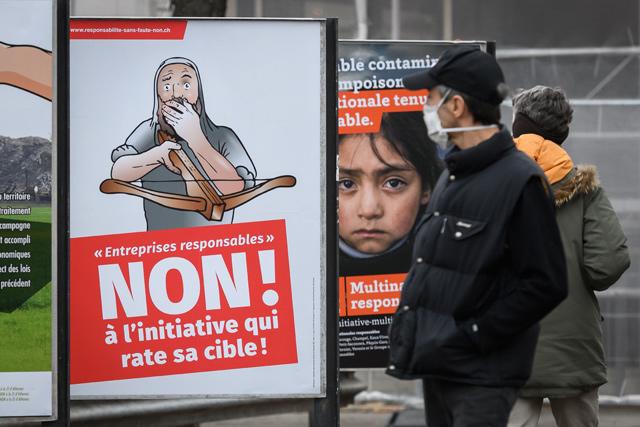- Mix
- Mon-2020-11-30 | 04:25 pm

A plan in Switzerland to impose the world’s strictest corporate responsibility rules, which would have made Swiss-headquartered multinationals liable for abusive business practices worldwide, failed to pass in a vote on Sunday.
The proposal would have amended the Swiss constitution and forced such companies to ensure they and their suppliers respected strict human rights and environmental protection standards.
But it failed to reach the double majority required for initiatives to pass, under federal Switzerland’s system of direct democracy.
Initiatives require support from a majority of voters nationwide, and from a majority of Switzerland’s 23 cantons, three of which are split in half.
While Swiss voters overall backed the initiative by a very narrow margin, a majority in most cantons voted against it.
Some 1,299,173 voters, or 50.7 per cent, backed the initiative, according to full results published by the ATS national news agency. The turnout was 46.7 per cent.
However, it only achieved a majority in eight-and-a-half cantons — including the four major cities of Zurich, Geneva, Basel and the capital Bern — with the rest voting against.
Softer counter-proposal triggered
The initiative was launched by an alliance of 130 non-governmental organisations and had the backing of trade unions and church groups.
It was opposed by both the government and parliament, which warned that while its intention was good, the proposed legislation went "too far”.
The rejection by voters automatically activated the government’s counter-proposal, which also requires companies to report on rights, environmental protections and corruption issues — but without being liable for violations.
Supporters of the rejected initiative plastered Swiss towns and cities with posters highlighting environmental degradation and human suffering caused by Swiss-based companies.
Multinationals are important drivers of the Swiss economy, which at the end of 2018 counted close to 29,000 such corporations, accounting for more than a quarter of all jobs in the country, according to official statistics.
The Swiss business community argued that the amendments could have been detrimental for all Swiss companies, not just those that behave badly.
Businesses and employer organisations voiced particular concern over a provision that would have made Swiss-based firms liable for abuses committed by subsidiaries unless they could prove they had done required due diligence.
Weapons financing ban rejected
Meanwhile voters rejected a separate proposal to ban funding companies that manufacture weapons and other materials of war — a move which could have blocked billions of dollars worth of investments.
The initiative would have barred the Swiss central bank and pension funds from investing in companies that make more than five per cent of revenues from sales of war material — while arms manufacturers would have been denied credit lines in Switzerland.
The initiative failed on both counts.
Some 1,460,755 voters, or 57.5 per cent, voted against the proposal, on a 46.4 per cent turnout, according to the results published by ATS.
Furthermore, a majority in only three-and-a-half cantons voted in favour.
Neutrality question
Famously neutral Switzerland, which has not been to war in centuries, already bans the production of nuclear, biological and chemical weapons, as well as landmines and cluster munitions.
But a coalition of peace groups and left-leaning parties sought a constitutional amendment making it illegal to finance any companies that make any form of war material, including assault rifles, tanks and their components.
According to a report earlier this month by research group Profundo, the central bank, large banks like UBS and Credit Suisse and other Swiss financial institutions have nearly $11 billion worth of loans and investments in arms companies, including BAE Systems, Lockheed Martin and Northrop.
Backers of the initiative claimed that the Swiss financial sector’s investments in arms companies were "incompatible” with Swiss neutrality.
But the government said the definition would effectively block funding of civil aviation firms such as Boeing, Airbus and Rolls Royce, and harm pensions.
-
 Will Trump end up like Kennedy?2026-02-03
Will Trump end up like Kennedy?2026-02-03








